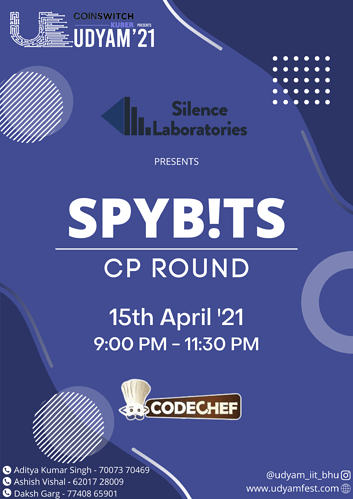Greetings Coders,
We would like to invite all of you to the SpyBits CP Round 2021, under the banner of Udyam’21, IIT (BHU) Varanasi.
Udyam is the annual technical fest of the Department of Electronics Engineering, Indian Institute of Technology (BHU), Varanasi organized from Apr 15-18, 2021.
The CP round of SpyBits is a hugely anticipated annual affair now, entering it’s 11th edition under different names and forms. It will take place on April 15th from 9:00 PM - 11:30 PM IST.
We would like to thank our Title Sponsors, CoinSwitch Kuber, and the Event Sponsors, Silence Laboratories.
Click here to go to the contest page.
The Problem Set has been prepared by Ashish Vishal, Daksh Garg and me, Aditya Kumar Singh
We would like to thank Jatin Yadav, Istvan Nagy, Daanish Mahajan , Shikhar Sharma, Achintya Kulshrestha and Ronit Raj for their support in testing and preparation of this contest.
Participants will have 2.5 hours to solve 7 problems. The scoring will be ICPC style. The contest will be rated for Div. 2 and Div. 3 participants, but even so, has some hugely exciting problems for everyone!
Prizes!
Merit Certificates shall be awarded for the Global Top 15 as well as Top 5 Indian participants
Good Luck everyone! Hope to see you on the leaderboard.
UPDATE
Click below to open EDITORIALS:
SAVE WATER
Valentine Couple
MISSION GOTHAM
PILGRIMS DESTINATION
MINIMUM OPERATION
STONE LAND
MAXPOOL
SOLVE IT

 Kudos to the authors!
Kudos to the authors!
 and got one WA…
and got one WA…

